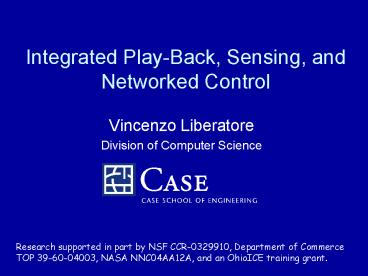Integrated Play-Back, Sensing, and Networked Control - PowerPoint PPT Presentation
Title:
Integrated Play-Back, Sensing, and Networked Control
Description:
Research supported in part by NSF CCR-0329910, Department of Commerce ... Countermand control. Scenario. Packet i 1 overtakes packet I. ti 1 ti ... – PowerPoint PPT presentation
Number of Views:11
Avg rating:3.0/5.0
Title: Integrated Play-Back, Sensing, and Networked Control
1
Integrated Play-Back, Sensing, andNetworked
Control
- Vincenzo Liberatore
- Division of Computer Science
Research supported in part by NSF CCR-0329910,
Department of Commerce TOP 39-60-04003, NASA
NNC04AA12A, and an OhioICE training grant.
2
Networked Control
- Computing in the physical world
- Components
- Sensors, actuators
- Controllers
- Networks
3
Networked Control
- Enables
- Industrial automation BL04
- Distributed instrumentation ACRKNL03
- Unmanned vehicles LNB03
- Home robotics NNL02
- Distributed virtual environments LCCK05
- Power distribution P05
- Building structure control SLT05
- Merge cyber- and physical- worlds
- Networked control and tele-epistemology G01
- Sensor networks
- Not necessarily wireless or energy constrained
- One component of sense-actuator networks
4
Information Flow
- Flow
- Sensor data
- Remote controller
- Control packets
- Timely delivery
- Stability
- Safety
- Performance
5
Autonomy
- SR and real-time
- Autonomy
- Hide networked RT
- Hard to build a fully reliable system
- Tele-operation
- Network non-determinism is serious problem
- SR
- Reduce time constants
- Especially important for unexpected occurrences
NLN02
6
Playback Buffers Infocom 2006
- Play-back buffers
- Main objective
- Smooths out network non-determinism
- Multimedia buffers
- Important source of inspiration
- Physics versus multimedia quality
- Playback delay computed in advance
- Affects control signal computation
- Round-Trip Times
- TCP RTO
- Another source of inspiration
- Large time-out cost
7
Algorithm
8
Main Ideas
- Predictable application time
- If control applied early, plant is not in the
state for which the control was meant - If control applied for too long, plant no longer
in desired state - Keep plant simple
- Low space requirements
- Integrate Playback, Sampling, and Control
9
Algorithm
- Send regular control
- Playback time
- Late playback okay
- Expiration
- Piggyback contingency control
10
Deadwood packets
- Old
- Received after the expiration time
- Out-of-order
- Later control more appropriate for current plant
state - Would get us into a deadlock
- New packet resets the playback timer
- Keep resetting until no signal applied
- Quashed packet
- Discard!
controller
plant
Playback delay
11
Countermand control
- Scenario
- Packet i1 overtakes packet I
- ti1 ltlt ti
- Likely caused by delay spike
- New signal countermands previous one
controller
plant
ti
Playback delay
ti1
12
Playback delays
- Modular component
- Compute playback delay t and sampling period T
- Use short term peak-hopper EL04
- Original peak-hopper for TCP RTO
- Too conservative for networked control
- Aggressively attempt to decrease t
- Aggressively attempt to decrease T
- Add upper bound on playback delay t
- Avoid dropping deadlock packets
- Bound t TRTT
- Caps t and T
- Must estimate lower-bound on RTT
- Use symmetric of peak-hopper
- Add negative variability estimate to compensate
for short-term memory
13
Playback Delays (I)
Calculate current RTT variability
Positive variability coefficient
Negative variability coefficient
if
then
Update min RTT estimate
Age min RTT estimate
Calculate ?
14
Playback Delays (II)
if
then
Attempt to avoid quashed packets
else
Increase sampling period
15
Control Pipes
- Bandwidth and delays
- t is playback delay
- T is sampling period
- 1/T proportional to bandwidth
- Control pipe
- Tt
- Multiple in-flight packets
- Pipe depth
- Bound by constraint t TRTT
- Keep pipe predictable
16
Observer
- Estimate future plant state
- Plant sample current state, including local
variables - Keep log of outstanding control packets
- Assumption on packet delivery
- Future packet delivery is uncertain
- Purge from log
- Old packets
- Packet that should be overtaken by new control
- Countermands signals generated when delay spike
is transient - Out-of-order packets
17
Evaluation
18
Network Model
- Simulated network
- Losses Gilbert model
- Delays
- Shifted Gamma distribution
- Heavy tail
- Low probability of out-of-order delivery
- Correlate delays to introduce delay spikes
- Wide-area implementation
- Use RT scheduling whenever possible
- Use otherwise unloaded machines
- RT made little difference
- Host worldwide, heterogeneous conditions
19
Plant
- Scalar linear plant
- Plant state x(t)
- Input u(t) (control)
- Output y(t)
- Disturbances v(t), w(t)
- Akin to white noise
- Deadbeat controller
- Aggressive
20
Metrics
- Metrics
- Root-mean square output
- Output 99-percentile
- Comparison
- Open-loop plant u(t)0
- Proportional controller (no buffer)
- Proportional controller with constant delays
21
Plant output
Open Loop
Play-back
22
Packet losses
Figure 8
23
Sampling period
Imperfection of the control pipe
Root-mean-square error
24
Conclusions (I)
- Sense-and-Respond
- Merge cyber-world and physical world
- Critically depends on physical time
- Playback buffers integrated with
- Sampling (adaptive T)
- Control (expiration times, performance metrics)
- Packet losses
- Reverts to open loop plant (contingency control)
25
Conclusions (II)
- Playback delay t
- Adapts to network conditions
- Sampling period T
- Avoids imperfection of control pipe
- Simulations and emulations
- Low variability around set point
- Robust































